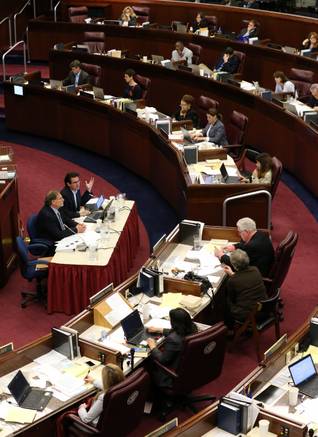
Cathleen Allison / Associated Press
Nevada Gov. Brian Sandoval’s Chief of Staff Mike Willden, center left, and Economist Jeremy Aguero testify Saturday in an Assembly Committee of the Whole hearing at the Legislative Building in Carson City.
Saturday, May 30, 2015 | 3:21 p.m.
Lawmakers had a final presentation on Gov. Brian Sandoval’s tax plan Saturday, vetting an amendment that sets the stage for a critical vote in the Assembly that likely will determine the fate of the tax and the looming questions about a special session.
The amendment to Sandoval’s proposal, Senate Bill 464, is the governor’s third attempt at levying a tax this session to bolster the state’s bottom-tier public education system and fund a $7.4 billion biennium budget. Speaking about the tax plan were Sandoval’s chief of staff, Mike Willden, and the administration’s go-to private economist, Jeremy Aguero. They held a hearing on the measure in a presentation on the chamber floor.
Sandoval, his staff and a host of gaming lobbyists were willing to offer concessions in the amendment. The Assembly Republican Caucus has brought uncertainty about whether there will be enough votes to pass this proposal to the Senate, which likely would send it to Sandoval’s desk. Another change to the plan was in the works, Willden said.
A vote on the measure was likely come by Sunday afternoon or evening.
WHAT IT SAYS
Willden and Aguero outlined the plan and fielded questions from lawmakers about broadening the tax base, its relationship to the margin tax initiative and its effect on small businesses. The amendment would raise at least $255 million every year from increasing rates on the state’s payroll tax, adding a business-filing fee and creating a gross-receipts tax, which would add out-of-state businesses that currently profit from their sales in Nevada.
Businesses earning less than $4 million a year would be exempt from paying the gross-receipts portion. For companies making more than $200,000 per year, the rates on the payroll tax will be increased from 1.17 percent to 1.475 percent, with mining and financial institutions paying 2 percent. Businesses would be able to credit 50 percent of their gross-receipts tax against the payroll tax.
The gross-receipts section — which is estimated to raise $120 every two years and charge a rate based on 27 business classifications — is the controversial part of the bill.
Many lawmakers asked Aguero the same question.
“Isn’t this just the margin tax?” Assemblyman Jim Wheeler asked in reference to the ballot initiative that 80 percent of voters opted to kill in the November election.
Aguero, who conducted studies on the ballot initiative, stressed the various differences. The margin tax was a flat 2 percent rate on businesses earning more than $1 million and would have raised at least $800 million.
“The tax rate is different,” Aguero said. “The tax base is different. The process in which we apply it is different. The yield is about a fourth of what it was under that tax. In almost every meaningful way it is different.”
Certain revenues for gaming, mining, health care and investment income are exempted in the bill.
NEVADA INDUSTRIES
The retail and trucking industries showed opposition to the measure. Trucking supports all parts of the plan except the gross-receipts tax.
Paul Enos, a lobbyist for the Nevada Trucking Association, said the tax will be equivalent to a 12 percent income tax rate for his members.
“For the trucking industry, this puts us at a rate 27.8 times higher than California,” he said.
Bryan Wachter, a lobbyist for the Retail Association of Nevada, worried about the trickle-down effect of the tax on consumers, saying it likely would increase the price of goods at stores.
Aside from the dissent, there was a wave of support from gaming, mining, the Las Vegas Metro Chamber of Commerce and other companies in the state.
The chamber, which represents 4,000 businesses in Southern Nevada, came out in support of the measure in the past week. The decision marked the first time the chamber supported a tax on gross receipts of businesses.
“There are problems with all forms of taxation,” Jim Wadhams, a lobbyist for the chamber, said. “But these are good compromise.”
Gaming, which last pushed for a gross-receipts tax in 2003, said it supports the measure but that taxes on services and sales need to be looked at in a future session.
“We need to continue this discussion,” said Billy Vassiliadis, a lobbyist for the Nevada Resort Association.
THE FIGHT AHEAD
Still up for debate is whether the Assembly Republican Caucus will be able to undermine the two-thirds majority necessary to pass a revenue increase in the state.
Sandoval’s staff and gaming consultants were lobbying GOP lawmakers for their votes and gained momentum to steamroll attempts to block the tax. Early Friday there was consensus among a group of no-new-tax Republicans that the measure would die. But as the day moved along, “no” votes started dropping out.
With the 17 Assembly Democrats all likely to vote in favor, Republicans need 15 of their 25 Assembly members to vote no. There are a handful of swing votes that could upend the tax measure from passing as written. But some Republicans who were “no” votes earlier in the week have signaled they will support the measure. Two of them are Southern Nevada Assemblymen Derek Armstrong and Erv Nelson. Both announced their decisions Saturday morning.
Assemblyman Ira Hansen, a Sparks Republican, was confident earlier in the week that his caucus would kill the tax plan. By the weekend, his tune was changing.
Hansen, who is one of the steadfast “no” votes on the measure, told the Reno Gazette-Journal that there might not be 15 votes to stop the tax from passing.

Join the Discussion:
Check this out for a full explanation of our conversion to the LiveFyre commenting system and instructions on how to sign up for an account.
Full comments policy